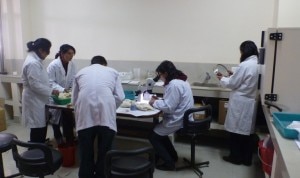Policies for genetic research, preserving seeds of local species in the offing

KATHMANDU, Nepal- With the deadline to format a national seed plan approaches, the government is working to finalize its plan on exchange of aboriginal seeds for genetic research and to preserve seeds of local species through seed bank.
Food and Agriculture Organization (FAO), a specialized agency of the United Nations that leads international efforts to defeat hunger, has called policy papers from its member countries with deadline of 2013 to enforce the International Treaty on Plant Genetic Resources for Food and Agriculture (ITPGRFA).
FAO serves as a source of knowledge and information, and helps developing countries and countries in transition modernize and improve agriculture, forestry and fisheries practices, ensuring good nutrition and food security for all.
As Nepal is a signatory to the treaty along with 126 countries, it is binding for the country to prepare and submit its national plans before the time expires. Also as per the FAO provision the country cannot import from or exchange aboriginal seeds with other countries without developing a national plan.
Agriculture experts say the policy has been seen as a crucial treaty in the fight against hunger and poverty as it guarantees seed rights to farmers, and envisions non-commercial exchange of seeds among member countries.
“This is the last year, so we have to submit a national plan to FAO,” said agriculture economist of Nepal Agriculture Research Council (NARC) Devendra Gautam.
“The plan is crucial for importing environment friendly seeds and for developing new varieties,” he said adding that Nepal can import aboriginal seeds from other countries only after the plan is submitted. According to him, Nepali agriculture scientists have been exploring seed varieties in the country and classifying them for the purpose.
The government has given Gene Bank the sole responsibility to develop a plan and work under the guidelines of ITPGRFA.
Following the development of a plan report, the country has to reform its laws and policies to exchange seeds.
NARC, Department of Agriculture, universities, researchers, seed companies and non-governmental organisations have been working on preparing the report for FAO under ITPGRFA.
EvK2CNR, an Italian non-profit research agency has been collaborating and assisting the Nepal Academy of Science and Technology (NAST) with the technical and logistic support to establish Himalayan Seed Bank at the NAST premises.
Established two years ago, as the first Seed Bank of the world dedicated to the Himalayan alpine flora being hosted in the NAST Research Lab located in Khumaltar, Lalitpur, the Bank has been collecting, preserving and researching on high altitude biodiversity of the Sagarmatha National Park. The Himalayan Seed Bank is conducting research on more than 100 seeds collected from an altitude between 2800 to 4200 meters from Lukla to Pheriche.
According to Ministry of Agriculture, the Gene Bank has collected around 10,000 seed varieties in the country so far.

